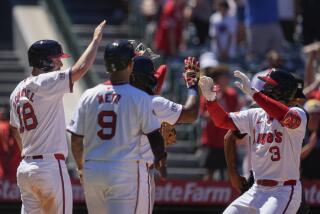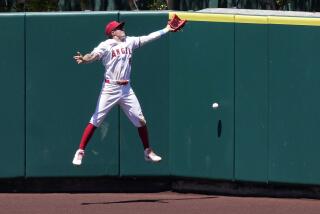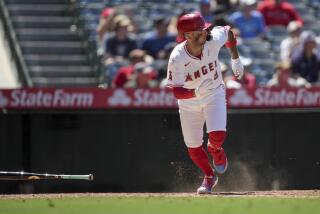Angel Sweep Would Look Better Under the Carpet
- Share via
BALTIMORE — Worst against worst was an education, if nothing else. And what was learned in these three games between the Angels and the Baltimore Orioles, especially in Thursday’s twi-night, twice-the-fright doubleheader, is that both teams call last place home for a reason.
After Wednesday’s series-opening loss to the one-time 0-21 Orioles, a defeat that Angel General Manager Mike Port merely called the greatest embarrassment of his professional baseball career, the Angels swept two of the ugliest games ever to share the same bill--2-1 in 10 innings and 9-6, with the help of a seven-run eighth inning.
In the first game, these teams tied an American League record by combining to hit into nine double plays. And the Angels desperately needed the ninth, which was the only way they could find to bring home the winning run in the 10th inning.
In the second game, the Angels fell behind, 6-1, when Dan Petry surrendered five runs in the third inning, including one of Fred Lynn’s two home runs, but the Baltimore bullpen couldn’t protect even that. By the time Doug Sisk and Tom Niedenfuer were done with the eighth inning, the Angels had bled the Orioles for 7 singles and 7 runs, sending 13 batters to the plate.
“Right now, it doesn’t matter how we do it,” said Angel relief pitcher Greg Minton, who saved the second game with two scoreless innings. “We’ll scuffle along any way we can, just as long as we win.”
Even if it requires 10 innings and a last-gasp rally to steal two games from the Orioles, who are 6-33.
“We just have to start winning,” Minton continued. “If we can do that, maybe we’ll start to believe we’ve got a good club. Right now, I don’t think too many people on this team believe that.”
It would have been difficult to discern that much from this pair of ragged games. In truth, the Angels came close to blowing a doubleheader to Baltimore.
To salvage the first game, the Angels needed the extra inning and a run-scoring double-play grounder by Chili Davis, who, somewhat remarkably, was still around and available to pinch-hit. In a couple of peculiar non-moves, Angel Manager Cookie Rojas kept Davis on the bench while Junior Noboa (.000) was allowed to bat with a runner on second base in the seventh inning and while Chico Walker (.150) was allowed to bat with a runner on first in the ninth inning.
Noboa flied out and Walker struck out, leaving both runners stranded. Had Rojas considered using Davis in either spot?
“No sir,” he said.
Maybe he was saving Davis for extra innings.
And a 10th inning was required because through the first nine, the Angels could manage just one run off Mike Boddicker, a pitcher with an 0-8 record in 1988 and an 0-13 mark since last Sept. 4.
Despite hitting into five double plays through the first seven innings of the first game, Baltimore took a 1-1 tie into the bottom of the ninth--partially because the Angels had hit into three double plays of their own. And in the bottom of the ninth, the Orioles had the winning run at third base with two outs before Angel reliever Bryan Harvey struck out rookie Keith Hughes on a pitch in the dirt.
Riding the momentum of that out into the top of the 10th, the Angels greeted Oriole reliever Dave Schmidt with singles by Bob Boone and Brian Downing, Boone legging his way to third.
Davis, finally called upon to pinch-hit, followed with a grounder to second baseman Billy Ripken, who had a choice of either firing an off-balance throw homeward or turning a record-setting double play. Ripken went for the double play, giving both teams a share of the league single-game record, and Boone went home to score the decisive run.
Why not throw to the plate on the play? And why, in the 10th inning with a runner on third, were the Orioles playing with their infield back?
“If he (Davis) gets it through, then we’re facing a big inning,” said Elrod Hendricks, Baltimore’s acting manager. “One run and we’re still in the ballgame--rather than them breaking it wide open. Billy had no chance of throwing home.”
So, Davis tied a double-play record . . . and won a game.
“What the . . . “ Davis said. “Should I be happy or should I be mad? If I could change anything, I’d like to have hit it over the fence. But we’ve got to do anything we can do to win.”
Even if, as in the second game, they fall behind by five runs, dawdle around until the eighth inning and then milk three pitchers for seven runs without the aid of an extra-base hit.
Baltimore starter Jay Tibbs stood in and faced the first three singles, which resulted in RBIs by Tony Armas and Davis. Then came Sisk, who faced two batters and gave up two more singles, pulling the Angels within 6-5.
Finally, Hendricks called upon Niedenfuer, who got one out before loading the bases on another single to Downing.
Then a squeeze bunt by Mark McLemore--which meant suicide for the Orioles. McLemore pushed the ball right back at Niedenfuer, who barehanded it and fired home. And beyond. Niedenfuer’s throw got away from catcher Terry Kennedy, enabling Noboa to score the tying run and Schofield to score the go-ahead run from second base.
The Angels added another run in the inning on an infield single by Armas, before Butch Wynegar tripled and scored on a single by Downing in the ninth.
“That’s the way we should play every day--hustling and never giving up,” Rojas said.
Well, maybe not every day. It isn’t every day one gets to play two games against the Baltimore Orioles.
Angel Notes
The 12 double plays by both clubs in both games also tied the American League record for most double plays in a doubleheader. The major league record is 13, set by the Giants and the Phillies in 1939 and the Pirates and the Cardinals in 1948. . . . Fred Lynn’s two home runs against Dan Petry in the second game left him with seven career home runs against the Angel pitcher. Overall, Lynn is batting .367 (18 for 49) against Petry. . . . Petry lasted 6 innings, yielding 6 runs on 9 hits and a walk. Stewart Cliburn replaced Petry and by pitching a scoreless seventh inning, he became the Angels’ pitcher of record when his teammates launched their seven-run eighth inning. For Cliburn, the victory was his first since 1985. . . . Kirk McCaskill, the Angels’ starter in Game 1, benefited greatly from Baltimore bouncing into five double plays. With them, McCaskill was able to limit the Orioles to 1 run in 8 innings despite yielding 8 hits and 5 walks.
More to Read
Go beyond the scoreboard
Get the latest on L.A.'s teams in the daily Sports Report newsletter.
You may occasionally receive promotional content from the Los Angeles Times.






